In today’s digital-first world, search engines are often the first place customers turn to when discovering new products, services, or businesses. This shift has made SEO (Search Engine Optimization) one of the most vital components of any online strategy. So, what is an SEO company, and why does it matter? An SEO company, often called an SEO agency or SEO expert, specializes in enhancing a website's visibility on search engine results pages (SERPs) by implementing strategies such as on-page, off-page, and technical SEO.
By optimizing a site’s content, structure, and authority, an SEO company helps businesses drive organic traffic, improve search engine rankings, and increase conversions without the need for paid advertising. For digital marketing professionals, understanding what is an SEO company and how it fits into a broader growth strategy is essential. Whether you’re in-house, part of a larger agency, or a business owner evaluating vendors, knowing how an SEO business operates can help you make informed decisions that drive real results.
What Is an SEO Company?
An SEO agency is a firm that specializes in improving a website’s visibility and ranking on search engine results pages (SERPs) through a combination of content optimization, technical improvements, and link-building strategies.
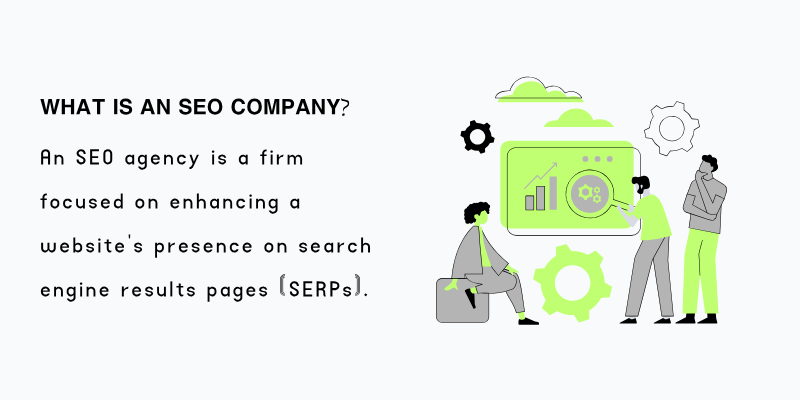
By optimizing websites and content, they help businesses increase organic (non-paid) traffic and improve their rankings for relevant keywords. In essence, SEO agencies serve as strategic partners, enabling businesses to reach the right audience online.
In practical terms, an SEO company’s goal is to increase a client’s website traffic and conversions from search engines like Google by achieving higher rankings for relevant search queries.
They accomplish this by optimizing various aspects of the website (content, design, technical setup) and by enhancing the site’s authority and relevance on the web (through content marketing and link building).
A reputable SEO agency will develop and implement a customized SEO strategy to help a business attract more organic traffic, rank for targeted keywords, and ultimately boost leads or sales from search engines.
This often includes researching what a company’s target audience is searching for, optimizing the website to match those search intents, and making the site more “search engine friendly.”
SEO companies typically work with a range of clients, from small local businesses to large enterprises, and tailor their services to each client’s goals and budget.
What services do SEO companies provide?
SEO is a multi-faceted field. Most SEO companies offer a range of services that address different aspects of optimization.
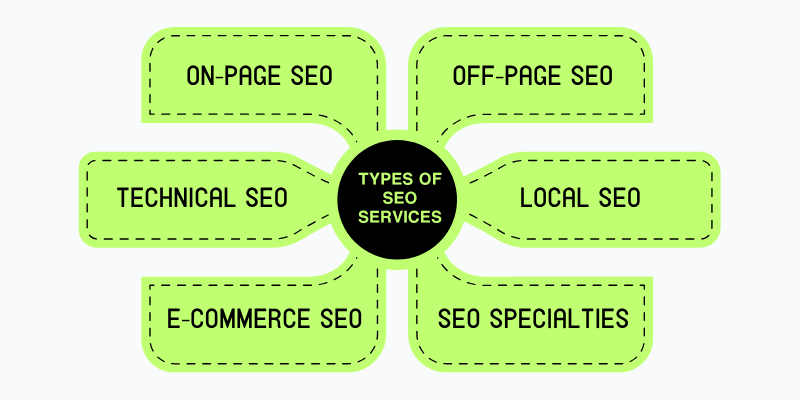
Here are the common types of SEO services an agency may provide:
1. On-Page SEO
Optimizing the content on your website to align with target keywords and search intent. This includes keyword research, improving page copy, crafting compelling title tags and meta descriptions, optimizing headers, internal linking, and ensuring content quality and relevance.
2. Off-Page SEO
Building your site’s authority and reputation off your website. The primary component is link building, earning high-quality backlinks from other reputable sites as well as managing online mentions and brand signals.
Off-page SEO helps search engines see your site as trustworthy and authoritative.
A good SEO company will engage in ethical outreach to acquire quality backlinks (e.g. through content promotion or partnerships) rather than spammy link schemes.
3. Technical SEO
Improving the technical foundation of your website so that search engines can crawl and index it effectively. This service deals with site architecture, page speed optimization, mobile-friendliness, URL structure, schema markup, fixing broken links, and ensuring there are no crawl errors or indexing issues.
Technical SEO is crucial for giving search engine bots easy access to your content and providing a smooth user experience.
4. Local SEO
Focusing on optimizing for location-specific searches and GEO-targeted queries to appear in local search results. Local SEO services help businesses appear in location-based searches
This includes optimizing your Google Business Profile, managing online reviews, ensuring NAP (Name/Address/Phone) consistency in local directories, building local citations, and creating location-specific pages or content.
Start Improving Your Local SEO Today!
5. E-commerce SEO
Specialized optimization for online stores and product-based websites. E-commerce SEO services involve optimizing product pages (descriptions, images, meta tags) for relevant product keywords, improving mobile optimization, and implementing structured data (schema markup) to enhance product visibility on search engines.
An SEO company experienced in e-commerce will address issues like duplicate content (common with product pages), cart optimization, and integration with platforms like Amazon or Shopify to help increase organic product visibility.
Drive More Traffic with E-commerce SEO Services!
6. Other SEO Specialties
Depending on the agency, there may be additional services such as Mobile SEO (ensuring your site is mobile-friendly, especially important after Google’s mobile-first indexing), International SEO (optimizing for multiple languages or countries), Content SEO (focused specifically on content strategy and optimization), Video SEO (optimizing YouTube videos or video content for search), etc.
While these are often subsets of the core categories above, top SEO companies will tailor their offering to the client’s specific needs.
For example, a SaaS business might need content-driven SEO and technical SEO, whereas a brick-and-mortar local business might prioritize local and on-page SEO.
How SEO Works? 3 Step Process
Understanding how search engines function is key to understanding what an SEO company does. Here’s the foundational process:
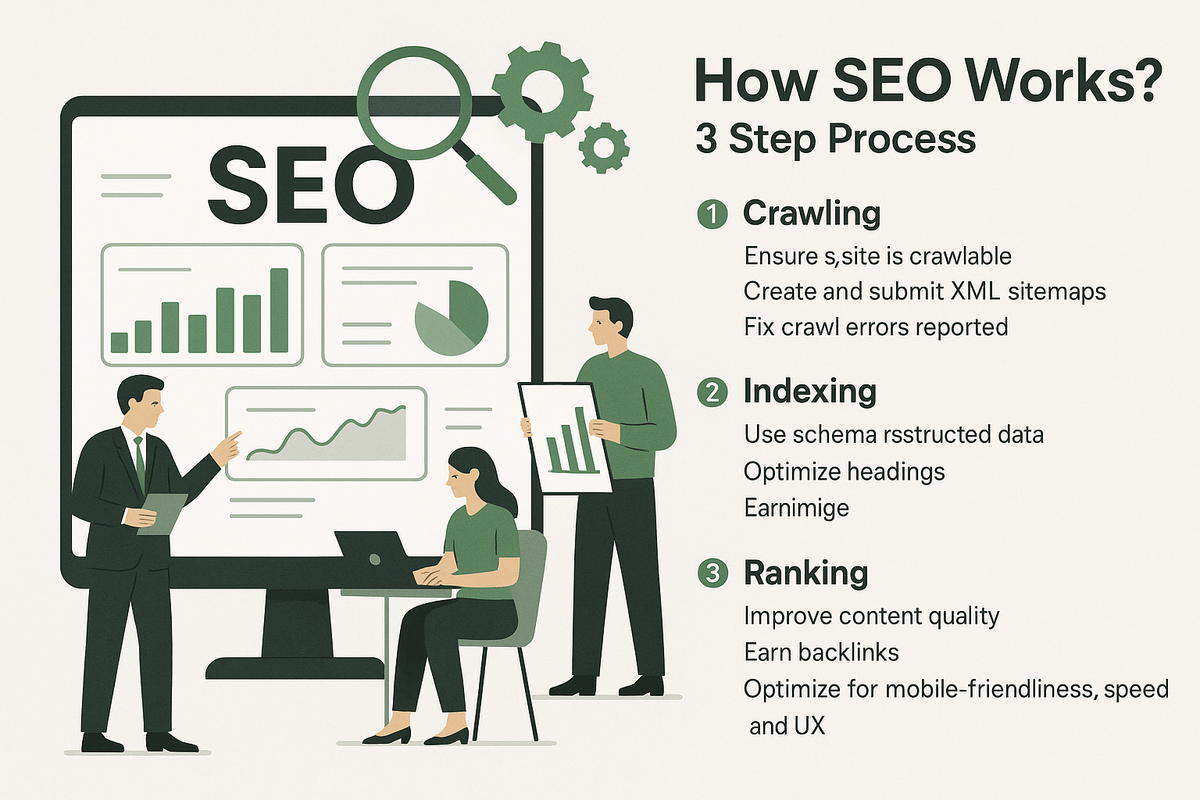
1. Crawling
Search engines use automated bots (also called spiders or crawlers, web crawlers) to explore the web and find new content. These bots read your web pages, blog posts, and files—then follow internal and external links to discover more.
What SEO companies do:
- Ensure your site is crawlable
- Create and submit XML sitemaps
- Optimize robot.txt files
- Fix crawl errors reported in Search Console
2. Indexing
After crawling, the content is stored in a massive database called the index. Google tries to understand what each page is about by analyzing text, images, metadata, and other signals.
What SEO companies do:
- Use schema markup and structured data
- Ensure canonicalization (to avoid duplicate content issues)
- Optimize headings, meta tags, and internal linking
3. Ranking
When a user types a query, search engines retrieve relevant results from their index and rank them based on algorithms considering over 200 ranking factors—like relevance, authority, and user experience.
What SEO companies do:
- Improve content quality and keyword relevance
- Earn backlinks from high-authority sites
- Optimize for mobile-friendliness, speed, and UX
SEO Tools & Technology Used by an SEO Company
If you’ve ever wondered what is an SEO company or what is an SEO agency, the answer lies not only in strategy but also in the tools they use.
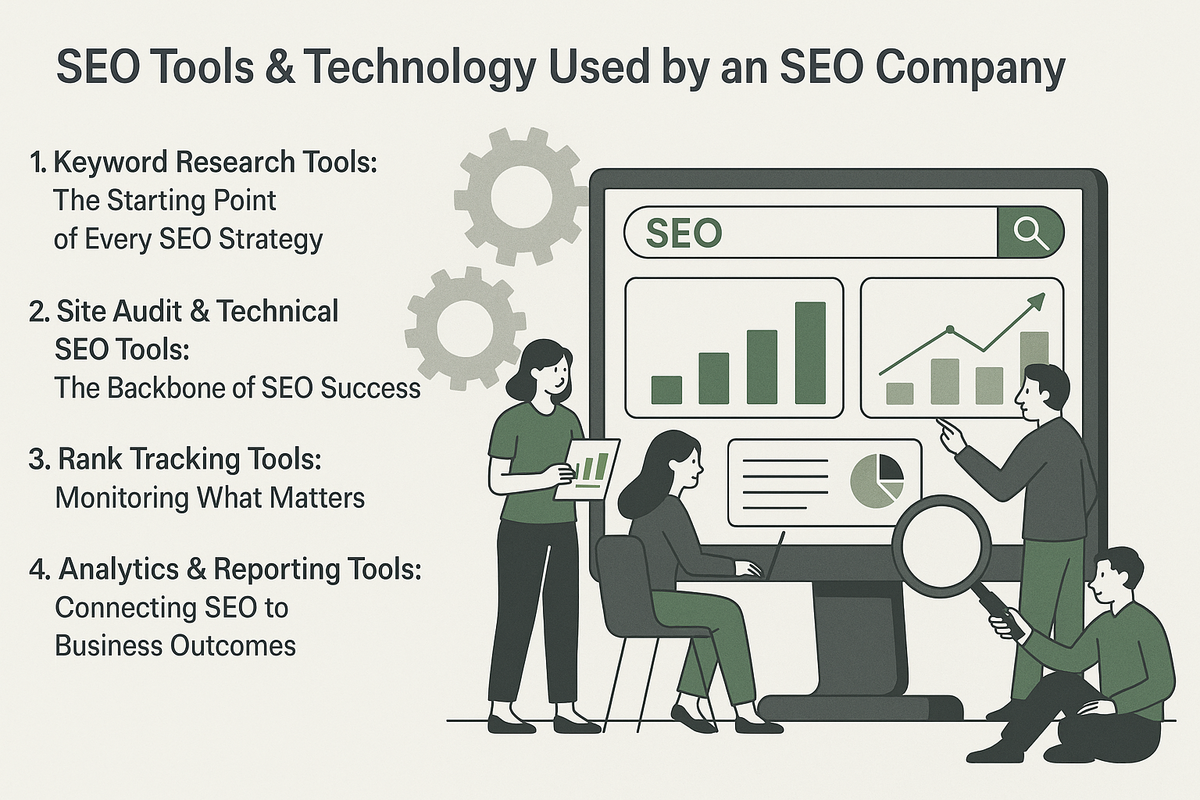
An effective SEO company doesn’t operate based on guesswork, it relies on advanced, data-driven platforms to plan, execute, and measure SEO performance. At Centric, we combine world-class tools and proprietary technology to deliver real, measurable results for our clients. This toolkit is what separates a basic digital marketer from a full-service SEO agency with proven success.
Here’s a detailed look at the essential categories of tools used by any high-performing SEO company and how they contribute to sustainable growth.
1. Keyword Research Tools: The Starting Point of Every SEO Strategy
Any legitimate SEO company starts with keyword research. This is the process of discovering exactly what your audience is searching for online. These tools reveal high-traffic, low-competition keywords that align with your business goals.
Tools We Use:
- SEMrush: Helps identify keyword gaps, uncover user intent, and benchmark competitors’ SEO performance.
- Ahrefs: Useful for long-tail keyword discovery, backlink analysis, and identifying content opportunities.
- Ubersuggest: Great for small businesses or local SEO campaigns needing quick insights on volume and competition.
- Google Keyword Planner: A must-have for understanding trends, CPC data, and keyword search volume, especially from a PPC and SEO hybrid perspective.
How These Tools Help Us:
- Discover high-value keywords that match buyer intent
- Segment keywords into informational, navigational, and transactional types
- Develop content calendars and pillar pages
- Map keywords to landing pages for targeted on-page SEO
- Support foundational strategies in every SEO business
If you're researching what is a SEO company, this is one of the first functions to understand, turning search behavior into strategic content.
Try Our Free Keyword Research Tool!
2. Site Audit & Technical SEO Tools: The Backbone of SEO Success
A big part of what an SEO agency does lies in identifying and fixing technical issues that may block search engines from fully crawling or indexing a site.
Tools We Use:
- Screaming Frog SEO Spider: Scans your site like a search engine bot to detect broken links, thin content, redirect loops, and more.
- Sitebulb: Offers a visual map of technical issues and organizes them by priority, making it perfect for large website audits.
- Google Search Console: Google’s own tool to track index coverage, site health, Core Web Vitals, crawl errors, and keyword performance.
How These Tools Help Us:
- Conduct deep technical audits to improve crawlability
- Fix 404s, redirects, and site structure problems
- Improve Core Web Vitals and mobile usability
- Ensure proper indexation for faster content discovery
- Implement and monitor schema (structured data), while understanding SEO audit pricing helps businesses budget effectively for these essential technical services.
Part of understanding SEO in company operations is knowing that success often starts with technical health, not just content.
Get Your SEO Audit Report Today!
3. Rank Tracking Tools: Monitoring What Matters
Once your SEO strategy is in motion, how do you know it’s working? That’s where rank tracking tools come in. These platforms are essential to every SEO company definition because they show where your keywords stand in Google, and how that translates to visibility and traffic.
Tools We Use:
- Centric Proprietary Rank Tracker: Tracks keyword performance across countries, languages, and devices, tailored to your market.
- Moz Pro Rank Tracker: Tracks SERP features (like featured snippets) and monitors volatility in search engine results.
- SE Ranking: Great for bulk tracking, GEO-specific results, and competitive rank comparison.
How These Tools Help Us:
- Monitor keyword positions daily, weekly, and monthly to check Google keyword ranking and ensure your SEO strategy remains on track. Compare rankings across mobile and desktop
- Assess competitor keyword movements
- Identify quick-win opportunities for fast ranking gains
- Analyze the effect of Google algorithm updates
If you're defining what is a SEO company, this function, ongoing performance monitoring, is a critical element.
4. Analytics & Reporting Tools: Connecting SEO to Business Outcomes
Knowing your rankings is useful. But knowing how SEO traffic converts into revenue? That’s business-critical. A data-driven SEO agency must connect SEO to actual ROI, and these tools make that possible.
Tools We Use:
- Google Analytics (GA4): Tracks user behavior, session duration, bounce rates, and attribution paths, across all traffic sources.
- Google Looker Studio (formerly Data Studio): Turns raw data into executive-friendly visual reports. Custom dashboards by KPI, source, and landing page.
- Hotjar: Delivers qualitative data via heatmaps, scroll tracking, and session recordings, great for conversion rate optimization (CRO).
How These Tools Help Us?
- Attribute leads, sales, and revenue to SEO traffic
- Identify underperforming pages and bounce hotspots
- Customize real-time dashboards for each client
- Segment traffic by channel, campaign, or behavior
A core part of what is an SEO business lies in delivering measurable, revenue-focused results, not just traffic.
Generate a Free SEO Report For Your Website!
How to Evaluate and Choose the Right SEO Partner?
Selecting the right SEO company is a crucial decision. Here are steps and considerations to help you evaluate candidates and choose an SEO partner that aligns with your needs:
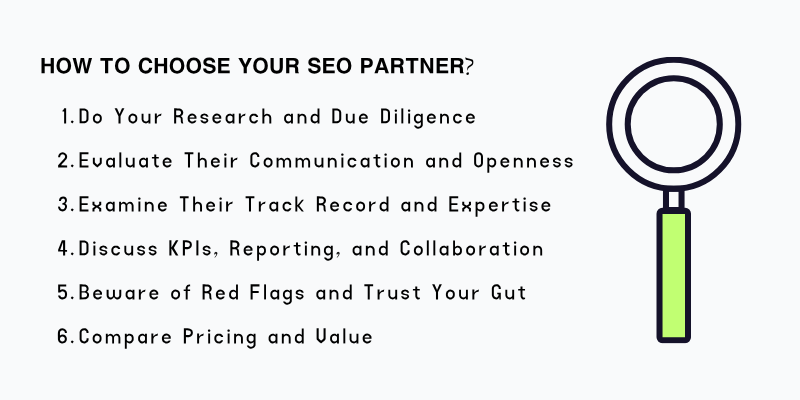
1. Do Your Research and Due Diligence
Start by compiling a list of potential agencies through referrals, online searches, or platforms like Clutch that list top marketing firms. For each, check their online presence and reviews.
Read client testimonials on their site, but also look for independent reviews on Google or industry forums. A strong SEO company should have a solid reputation.
2. Evaluate Their Communication and Openness
Reach out to the shortlisted agencies and set up an initial consultation or call. Pay attention to how they communicate.
A good SEO partner will ask about your business goals, clarify your expectations, and be willing to answer your questions in plain language..
3. Examine Their Track Record and Expertise
Request case studies or examples of past successes that are relevant to your needs. For instance, if you’re an e-commerce company, ask if they have experience with e-commerce SEO and if they can share results (like Client X saw +50% organic revenue after our optimizations etc.).
If your niche has particular challenges (say, SEO for medical content requiring E-E-A-T considerations), ensure the agency is equipped for that. However, even without same-industry experience, a strong generalist agency with robust processes can still be great.
The key is that they demonstrate a pattern of success and expertise in the core SEO services you need.
4. Discuss KPIs, Reporting, and Collaboration
An important part of choosing an SEO partner is aligning on how you’ll work together and measure progress. Ask about the KPIs they will track and how they report on them. You want to hear metrics that align with your business goals, not just “we’ll get you more links ”but rather “.
Good agencies will often require some involvement from the client’s side, whether it’s creating content approvals, implementing changes (if you prefer your dev team to do it), or feedback loops. Establishing those expectations upfront prevents misunderstandings later.
5. Beware of Red Flags and Trust Your Gut
As you go through proposals and conversations, keep in mind the red flags from the previous section. If anyone guarantees results, pushes you to sign immediately, or suggests shady tactics, eliminate them from consideration.
6. Compare Pricing and Value
Finally, weigh the proposals in terms of pricing relative to the value and services offered. The lowest quote is not always the best choice, often, you get what you pay for in SEO.
Look at how the agency structures their fees (monthly retainer vs. project) and what’s included. One might charge more but include content writing and technical fixes, whereas another might be cheaper monthly but expects you to handle content creation in-house.
A well-run SEO campaign will pay for itself several times over in the long run. That said, ensure the financial commitment is comfortable for your budget, given SEO’s timelines.
7 Red Flags to Watch Out for When Choosing an SEO Company
Choosing an SEO partner requires diligence. There are some clear warning signs that an agency might not be reputable or effective. Be cautious of any SEO company that exhibits the following red flags:
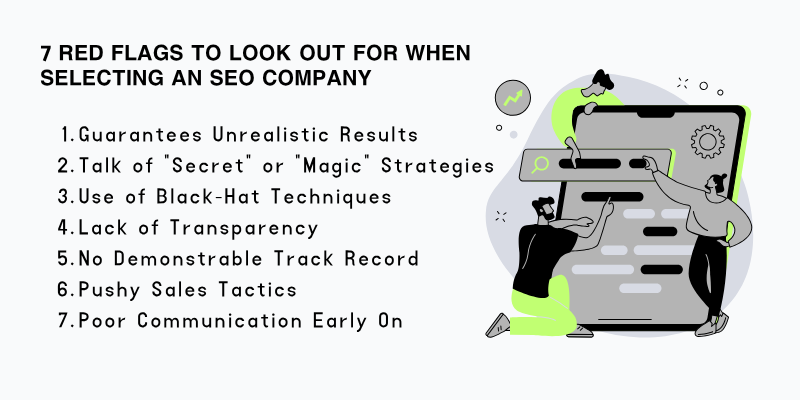
1. Guarantees of #1 Rankings or Unrealistic Results
If an agency promises “We guarantee you’ll be #1 on Google in a week” or any similar instant result claim, that’s a major red flag.
Guaranteeing specific rankings is impossible due to Google’s complex and ever-evolving algorithm. Ethical SEO is a long-term strategy that requires patience and consistent effort.
Reputable agencies will talk about strategy and projected outcomes, but won’t promise overnight success or “secret tricks.”
2. Talk of “Secret” or “Magic” Strategies
Be wary if an SEO firm is very opaque about what they will do, or claims to have proprietary techniques they can’t reveal.
While agencies don’t need to give away their know-how before you hire them, they should be able to outline a general game plan.
Phrases like “magic strategy” or unwillingness to explain their approach could hide shady practices.
3. Use of Black-Hat Techniques
As discussed, black-hat SEO can get your site penalized or banned from search results. Signs of black-hat methods include: suggestions to stuff keywords unnaturally into your content, a plan to buy large quantities of links or use link schemes, usage of cloaking or doorway pages, or auto-generated content spam.
If an agency’s proposal includes any quick-fix schemes that violate Google’s guidelines (often these sound too good to be true), run the other way.
Also listen for their attitude toward Google’s rules – reputable SEOs respect them; disreputable ones might brag about gaming the system (which rarely ends well).
4. Lack of Transparency or Vague Communication
If during initial discussions the agency cannot clearly explain what deliverables you will get, or if they dodge questions about their strategy (“don’t worry, we have our ways”), that’s a problem.
A professional SEO company should be willing and able to break down plan in understandable terms.
Similarly, if they seem reluctant to provide regular reports or say things like “Just trust us, you’ll see results,” consider that a warning sign. SEO requires collaboration and clarity you deserve to know what you’re paying for.
5. No Demonstrable Track Record
Everyone has to start somewhere, but you probably don’t want your site to be an experiment.
Be especially cautious of brand-new companies that claim years of expertise but have no proof (or of freelancers with grand promises but no portfolio).
6. Pushy Sales Tactics or Long-Term Contract Lock-in
Some less scrupulous agencies use high-pressure sales tactics for example, claiming a “limited time offer” or insisting you sign a long contract immediately.
While contracts are normal, be wary if you feel unduly pressured or if terms seem overly restrictive (e.g., auto-renew clauses without performance outs).
Legitimate firms let their service quality persuade you, not aggressive sales gimmicks.
7. Poor Communication Early On
The courtship stage can tell you a lot. If they are slow to respond when you’re a prospective client, or their proposal is sloppy and generic, that doesn’t bode well for the partnership.
6 Future Trends in SEO and How SEO Companies Are Adapting?
The world of SEO is ever-evolving, and staying ahead of future trends is part of an SEO company’s job. As we look at 2026 and beyond, several key trends are shaping search engine optimization, and leading SEO agencies are adapting their strategies accordingly.
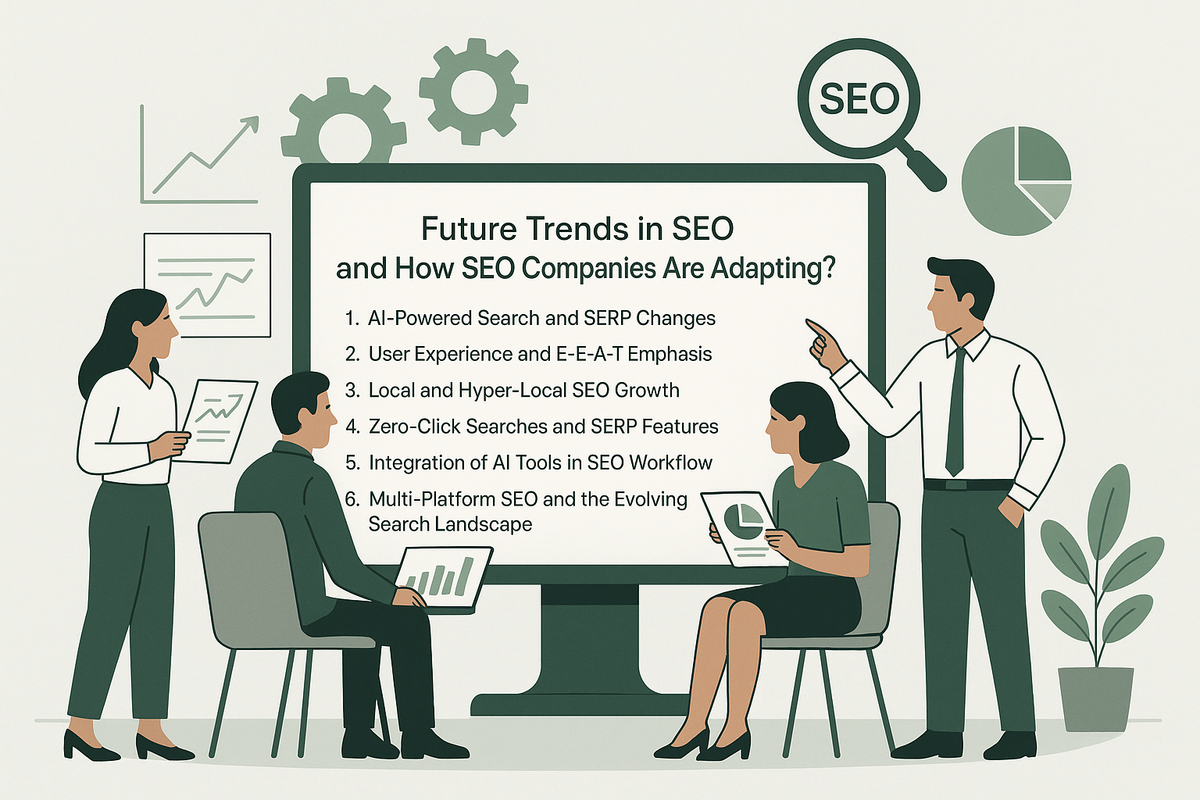
1. AI-Powered Search and SERP Changes
One of the biggest shifts is the rise of AI in search results. Google has introduced generative AI features in the SERP (such as AI-generated overviews via its Search Generative Experience), and other platforms like Bing integrate AI chatbots.
These AI summaries can provide users with answers right on the search page, which may reduce click-through rates to
Forward-looking SEO agencies are monitoring these trends and even optimizing content for platforms beyond Google such as creating FAQ content that might be sourced by voice assistants or AI chats.
The future of SEO will require content to be AI-friendly and strategies to consider visibility in an array of search environments.
SEO companies are adapting by staying agile they keep a close eye on Google’s AI updates and experiment with approaches to ensure their clients remain visible.
Just as mobile and voice search trends prompted changes in the past, AI is becoming a new layer of SEO strategy.
2. User Experience and E-E-A-T Emphasis
Google’s priority on user experience and content quality continues to strengthen. The concept of E-E-A-T (Experience, Expertise, Authoritativeness, Trustworthiness) in content was reinforced with Google’s “helpful content” updates and the addition of the extra ‘E’ (Experience) in late 2022.
This trend means that SEO is no longer just about keywords and links, it’s about credibility. SEO companies are increasingly helping clients invest in high-quality, authoritative content:
For industries like energy and natural resources, such as an oil and gas marketing agency, creating content that signals expertise and trustworthiness is crucial.
SEO agencies adapt by adding services around content strategy, online reputation management, and authority building.
They advise clients on creating content that genuinely satisfies user intent (which in turn keeps users on the page, signaling a good experience).
Explore Our Oil and Gas Marketing Agency!
3. Local and Hyper-Local SEO Growth
As search becomes more personalized, local SEO is growing even more prominent. Mobile usage keeps climbing (more than half of organic searches are now on mobile devices) and with that comes lots of “near me” and location-specific que.
Google’s algorithms have also gotten better at using precise location data to customize results. SEO agencies working with brick-and-mortar businesses or service-area businesses are adapting by placing a big emphasis on local search tactics
Also, the rise of voice search (e.g., asking Siri or Alexa for a nearby service) often has local intent, which means framing some content in a conversational Q&A style can capture those queries.
Optimize Your Local Visibility WIth Local SEO!
4. Zero-Click Searches and SERP Features
Google increasingly tries to satisfy queries directly on the results page, through featured snippets, knowledge panels, maps, and so on. We’ve seen a steady rise in zero-click searches, where the user doesn’t click any result because their query was answered immediately on the SERP.
5. Integration of AI Tools in SEO Workflow
On the operations side, SEO Consultants themselves are adopting AI and machine learning tools to improve their efficiency and capabilities.
AI-driven tools are helping with data analysis, content generation (with human oversight), and automation of repetitive tasks.
Generative AI (like GPT-based tools) can aid in drafting content briefs, meta descriptions, or even first drafts of content which SEO experts then refine.
Rather than replacing humans, these tools are augmenting human SEO work.
6. Multi-Platform SEO and the Evolving Search Landscape
SEO isn’t just about Google web search anymore. Future-oriented agencies consider SEO on various platforms, optimizing for YouTube (the second-largest search engine), for app store searches (ASO, or App Store Optimization, for clients with apps), and even for social media search to some extent (e.g., optimizing YouTube video descriptions or Pinterest boards for discovery).
Frequently Asked Questions
What is an SEO company?
An SEO company focuses on enhancing a website’s visibility on search engines, particularly Google. They help increase organic traffic by applying strategies like keyword research, content optimization, and link building.
What does an SEO agency do?
SEO companies assess and enhance a website’s ranking by optimizing content, refining site structure, performing keyword research, and acquiring high-quality backlinks. Their primary objective is to attract more targeted organic traffic and strengthen their clients' online presence.
How Does a SEO Company Work?
An SEO company improves website visibility on search engines through strategies like keyword research, content optimization, and link building to drive organic traffic and boost rankings.
What is the difference between an SEO company and an SEO agency?
Both SEO companies and SEO agencies provide similar services focused on search engine optimization. The terms are often used interchangeably, though “agency” may imply a broader range of marketing services alongside SEO.
What is the definition of an SEO company?
An SEO company is defined as a professional firm dedicated to enhancing a website’s search engine rankings by using strategic SEO techniques to drive organic traffic and improve online visibility.
What is a professional SEO firm?
A professional SEO firm is a company with expert knowledge and experience in search engine optimization. They use proven methods and stay updated with SEO trends to deliver effective results for businesses.
Why should my company invest in SEO services?
Investing in SEO services helps your company improve its online presence, attract more potential customers, and gain a competitive advantage in the digital market. SEO is essential for long-term business growth and brand credibility.
Book Your Free Expert Consultation!
Final Thoughts
As search engines become more sophisticated, the future of SEO will increasingly prioritize quality, both in terms of content relevance and user experience. The integration of AI into how search engines generate and display results is already reshaping the way users interact with search, and this trend will only accelerate. So, what is SEO company’s role in this evolving environment? Modern SEO companies are no longer just about keyword rankings, they’re strategic partners.
The best SEO providers, like Centric, are investing in content expertise, refining technical capabilities, and adopting next-gen tools to ensure their clients not only retain hard-earned visibility but also stay ahead of algorithm changes and new market demands. For digital marketing professionals, partnering with an SEO agency that is agile, future-ready, and aligned with your long-term goals is essential.
A proactive SEO partner can help you capitalize on emerging trends, adapt to AI-driven search changes, and ensure your brand continues to grow organically. In an industry where the only constant is change, knowing what is an SEO company, what it should offer, and how to choose the right one can make all the difference. With the right partner by your side, you can confidently navigate the complexities of search and build sustainable visibility for the future.








